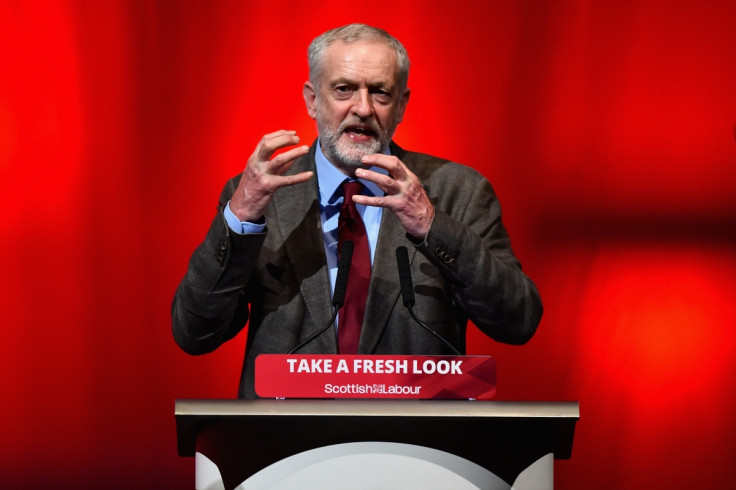The anti-democratic way Andrew Fisher and Corbynistas hurl abuse at those they disagree with

In terms of having an argument, the most revealing difference between the Right and the Left is that the Right will tell a person they are wrong whereas the Left will tell them they are a c**t.
This difference is the most striking thing about the Andrew Fisher brouhaha.
Fisher was Labour leader Jeremy Corbyn's recently appointed – and rapidly suspended – head of policy. Less than a month after his appointment to the influential role, Fisher was suspended by Labour's National Executive for apparently supporting a rival party – Class War – at the General Election. "If you live in Croydon South, vote with dignity, vote @campaignbeard," Fisher wrote on Twitter, in violation of Labour's rule that prevents party members from supporting non-party candidates.
Really of course, Fisher's suspension is one small incident in an ongoing faction fight between the Left and the Right of the Labour Party. When Corbynistas bemoan Fisher's suspension as part of a concerted attempt to wreak vengeance on the Left, they are being completely untruthful. But then, the Left would also purge the party of "Blairite" MPs and activists if it could. All talk of "democracy" by Labour activists of every stripe is pure humbug. What really matters is ensuring their own faction comes out on top.
But Fisher's flirtation with a rival party was never the most interesting thing about this story anyway. Fisher has apologised "unreservedly" for the Class War tweet, saying he "obviously [does] not and did not support Class War in any way". Notably, however, he hasn't apologised for calling Rachel Reeves a "w****r", for calling Sarah Vine a "piece of s**t", nor for speaking about how he would like to thump James Purnell.
Forget about his alleged support for a rival party; the most interesting thing about Fisher is the abuse he seems automatically to mete out to anyone whose politics differ from his own.
As with so many Corbynistas: "Exiling a critic outside the community of the good and punishing them for their bad faith is preferred to offering reasons why they may be mistaken on a matter of principle, policy or fact," as the academic David Hirch has put it.
On economic policy at least, my own politics are not hugely dissimilar to those of the so-called "hard Left". I believe the greatest threat to well-being in Britain is economic inequality.
As far as I am concerned, class, race and gender still have a greater influence on a person's life chances than ability or hard work – probably in that order. I do not subscribe to Jeremy Corbyn's naïve cod-pacifism, but I would not hesitate to call myself a democratic socialist.
What puts me off the whole thing is the socialists – the people like Andrew Fisher and the ubiquitous activists for whom any disagreement is the political equivalent of defecating on a tombstone.
The warning signs were there during the recent leadership contest, when everyone with second thoughts about Jeremy Corbyn was informed by the Twitter Stasi that they were in fact "Tory-lite" and should "f**k off". The admonition to "go and join the Tories" became so ubiquitous as to turn into its own vaguely subversive joke, with Labour moderates playfully instructing Jeremy Corbyn to "join the Tories" every time he made a concession to pragmatism.
Far from being a "kinder, gentler politics", as advocated by the Shadow Chancellor John McDonnell, the Corbynistas – and the far-Left more generally – are steeped in the politics of motive – the motive of one's opponents always and everywhere being the most sinister one imaginable.
To understand this one has to go back to Karl Marx's materialist conception of history. The prospects for communism may have turned to dust when the Berlin Wall came down, but Marx's influence on the Left – both good and bad – persists. To whittle it down to its essence, the Left carries around with it the Marxist idea that every politically conscious person is governed, whether they know it or not, by the desire to increase their own share of commodities.
For Marxists, politics is merely the expression of this desire – thus motivations which appear to cut across the economic are mere camouflage for underlying financial self-interest. The result is a paradoxical state of affairs in which left-wingers who supposedly believe humanity can be better go around viewing almost every action as rooted in bad faith.
Of course, we know that other motivations cut across purely economic considerations. To quote Bertrand Russell, who saw through communism earlier than most: "The materialist theory of history, in the last analysis, requires the assumption that every politically conscious person is governed by one single desire – the desire to increase his own share of commodities" (emphasis mine).
In reality things are a good deal more complex. Many of those who have not swallowed the Corbynite Kool-Aid are also trying to make the world a better place – their proposed solutions just happen to differ from those favoured by the far-Left. Blairites are not scum, as the Corbynistas might believe; they simply don't agree with Jeremy Corbyn on the best way to bring about a fairer Britain.
Yet for Leftists like Andrew Fisher, disagreement is considered an acceptable reason to, as Hirsh puts it, "push opponents out of the room" by showering them with abuse. This anti-democratic mentality – a mentality which seeks to delegitimize all opposition based on the view that it is motivated by bad faith - is far more worrisome that any alleged "disloyalty" on Fisher's part.
© Copyright IBTimes 2025. All rights reserved.






















